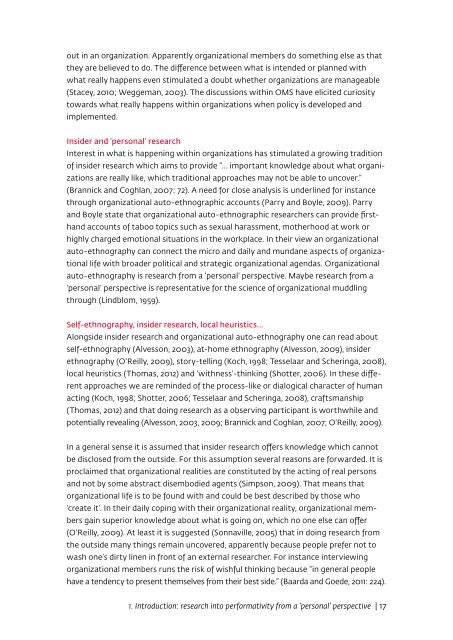Rumbling on performativity_Frits Simon
Rumbling on performativity_Frits Simon
Rumbling on performativity_Frits Simon
You also want an ePaper? Increase the reach of your titles
YUMPU automatically turns print PDFs into web optimized ePapers that Google loves.
out in an organizati<strong>on</strong>. Apparently organizati<strong>on</strong>al members do something else as that<br />
they are believed to do. The difference between what is intended or planned with<br />
what really happens even stimulated a doubt whether organizati<strong>on</strong>s are manageable<br />
(Stacey, 2010; Weggeman, 2003). The discussi<strong>on</strong>s within OMS have elicited curiosity<br />
towards what really happens within organizati<strong>on</strong>s when policy is developed and<br />
implemented.<br />
Insider and ‘pers<strong>on</strong>al’ research<br />
Interest in what is happening within organizati<strong>on</strong>s has stimulated a growing traditi<strong>on</strong><br />
of insider research which aims to provide “… important knowledge about what organizati<strong>on</strong>s<br />
are really like, which traditi<strong>on</strong>al approaches may not be able to uncover.”<br />
(Brannick and Coghlan, 2007: 72). A need for close analysis is underlined for instance<br />
through organizati<strong>on</strong>al auto-ethnographic accounts (Parry and Boyle, 2009). Parry<br />
and Boyle state that organizati<strong>on</strong>al auto-ethnographic researchers can provide firsthand<br />
accounts of taboo topics such as sexual harassment, motherhood at work or<br />
highly charged emoti<strong>on</strong>al situati<strong>on</strong>s in the workplace. In their view an organizati<strong>on</strong>al<br />
auto-ethnography can c<strong>on</strong>nect the micro and daily and mundane aspects of organizati<strong>on</strong>al<br />
life with broader political and strategic organizati<strong>on</strong>al agendas. Organizati<strong>on</strong>al<br />
auto-ethnography is research from a ‘pers<strong>on</strong>al’ perspective. Maybe research from a<br />
‘pers<strong>on</strong>al’ perspective is representative for the science of organizati<strong>on</strong>al muddling<br />
through (Lindblom, 1959).<br />
Self-ethnography, insider research, local heuristics...<br />
Al<strong>on</strong>gside insider research and organizati<strong>on</strong>al auto-ethnography <strong>on</strong>e can read about<br />
self-ethnography (Alvess<strong>on</strong>, 2003), at-home ethnography (Alvess<strong>on</strong>, 2009), insider<br />
ethnography (O'Reilly, 2009), story-telling (Koch, 1998; Tesselaar and Scheringa, 2008),<br />
local heuristics (Thomas, 2012) and ‘withness’-thinking (Shotter, 2006). In these different<br />
approaches we are reminded of the process-like or dialogical character of human<br />
acting (Koch, 1998; Shotter, 2006; Tesselaar and Scheringa, 2008), craftsmanship<br />
(Thomas, 2012) and that doing research as a observing participant is worthwhile and<br />
potentially revealing (Alvess<strong>on</strong>, 2003, 2009; Brannick and Coghlan, 2007; O'Reilly, 2009).<br />
In a general sense it is assumed that insider research offers knowledge which cannot<br />
be disclosed from the outside. For this assumpti<strong>on</strong> several reas<strong>on</strong>s are forwarded. It is<br />
proclaimed that organizati<strong>on</strong>al realities are c<strong>on</strong>stituted by the acting of real pers<strong>on</strong>s<br />
and not by some abstract disembodied agents (Simps<strong>on</strong>, 2009). That means that<br />
organizati<strong>on</strong>al life is to be found with and could be best described by those who<br />
‘create it’. In their daily coping with their organizati<strong>on</strong>al reality, organizati<strong>on</strong>al members<br />
gain superior knowledge about what is going <strong>on</strong>, which no <strong>on</strong>e else can offer<br />
(O'Reilly, 2009). At least it is suggested (S<strong>on</strong>naville, 2005) that in doing research from<br />
the outside many things remain uncovered, apparently because people prefer not to<br />
wash <strong>on</strong>e’s dirty linen in fr<strong>on</strong>t of an external researcher. For instance interviewing<br />
organizati<strong>on</strong>al members runs the risk of wishful thinking because “in general people<br />
have a tendency to present themselves from their best side.” (Baarda and Goede, 2011: 224).<br />
1. Introducti<strong>on</strong>: research into <strong>performativity</strong> from a ‘pers<strong>on</strong>al’ perspective | 17



